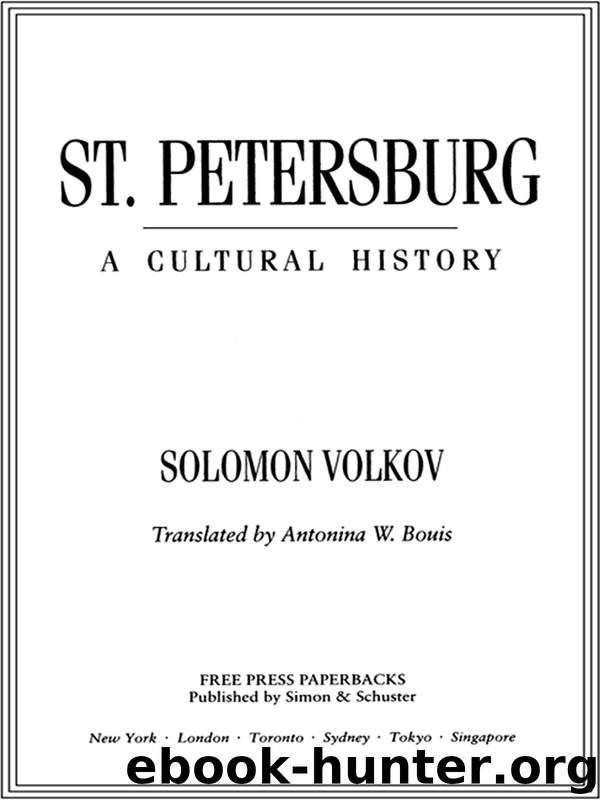St Petersburg by Solomon Volkov

Author:Solomon Volkov
Language: eng
Format: epub
Publisher: Free Press
Published: 1995-10-06T04:00:00+00:00
CHAPTER 5
in which our long-suffering city is renamed after a tyrant, undergoes dreadful ordeals in the Great Terror and the most horrible siege in recent history, and turns from a “crazy ship” into a “ship of the dead,” to be mourned in elegies and sung in requiems. This is the Leningrad of Dmitri Shostakovich.
There are black days in people’s lives. They are like eclipses of the sun.”1 This is how Galina Serebryakova, the writer and one-time lover of Dmitri Shostakovich, looked back in the 1960s at January 21, 1924, the day the glorified leader of Soviet and world Communists died, the ruler of Russia for over six fateful years, a clever polemicist, brilliant tactician, and ruthless politician, a man who spoke with a thick burr and had a skull shaped like that of Socrates or Verlaine—Vladimir Lenin.
The coffin with Lenin’s body was laid out in the Hall of Columns of the House of Unions in Moscow. The poet Vera Inber described the endless line of people come to say their farewells to the legendary Bolshevik. “A cloud composed of the breath of hundreds of thousands blanketed those waiting in line. The frigid air was motionless. In the sky, a triple halo that occurs only in extreme frosts veiled the moon.”2 Inside the Hall of Columns “the light of the chandeliers, wrapped in crepe, as if through a dark haze of fog, illuminated the coffin, banked with blood-red tulips.”3
It is difficult now to establish the actual emotions of the crowd that passed before Lenin’s bier. One thing is clear: everyone, even the enemies of Lenin and communism, recognized the significance of the moment. The history of an enormous country, which had always depended on the personal characteristics of its ruler, was once again at a crossroads. It was time to exclaim as Pushkin had in The Bronze Horseman, “Where are you galloping, proud steed,/ And where will you plant your hoofs?” It is only by appreciating the apocalyptic mood of the Russian people in the first days after Lenin’s death that we can understand how Mikhail Bulgakov, who had fought in the recent civil war against the Communists and who had no sympathy for the Bolsheviks, could have written in January 1924, “This coffin will be visited for four days through the cold of Moscow and then throughout the centuries across the faraway caravan routes of the yellow deserts of the globe, there where once, at the birth of humanity, an eternal star rose above its cradle.”4
Next to Bulgakov’s passage, the reaction of seventeen-year-old Dmitri (“Mitya”) Shostakovich, a student at the Petrograd Conservatory and a beginning composer (expressed in a letter to Tatyana Glivenko, with whom he was in love), seems almost like an understatement: “I’m sad, Tanechka, very sad. I’m sad that VI. Lenin has died and that I will not be able to say farewell to him because he is being buried in Moscow. The Petrograd Soviet applied to have his body moved to Petrograd, but this application must have been refused.
Download
This site does not store any files on its server. We only index and link to content provided by other sites. Please contact the content providers to delete copyright contents if any and email us, we'll remove relevant links or contents immediately.
| Africa | Americas |
| Arctic & Antarctica | Asia |
| Australia & Oceania | Europe |
| Middle East | Russia |
| United States | World |
| Ancient Civilizations | Military |
| Historical Study & Educational Resources |
Red Famine: Stalin's War on Ukraine by Anne Applebaum(2927)
Midnight in Chernobyl by Adam Higginbotham(2541)
Chernobyl by Serhii Plokhy(2534)
Midnight in Chernobyl: The Untold Story of the World's Greatest Nuclear Disaster by Adam Higginbotham(2220)
Red Shambhala by Andrei Znamenski(2193)
The House of Government by Slezkine Yuri(2191)
The Gulag Archipelago (Vintage Classics) by Aleksandr Solzhenitsyn(2095)
Red Notice by Bill Browder(2070)
All the Kremlin's Men by Mikhail Zygar(2064)
From Cold War to Hot Peace by Michael McFaul(2029)
Putin's Labyrinth(2016)
From Russia with Lunch by David Smiedt(1970)
The Future Is History by Masha Gessen(1904)
A People's Tragedy by Orlando Figes(1863)
The Romanovs by Simon Sebag Montefiore(1820)
How to Tame a Fox (and Build a Dog): Visionary Scientists and a Siberian Tale of Jump-Started Evolution by Lee Alan Dugatkin & Lyudmila Trut(1760)
The Lost Spy by Andrew Meier(1745)
Putin's Labyrinth: Spies, Murder, and the Dark Heart of the New Russia(1740)
Art and Revolution by John Berger(1721)
